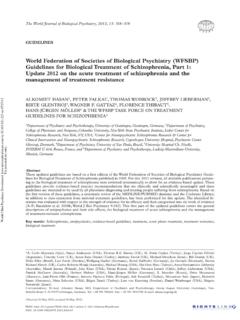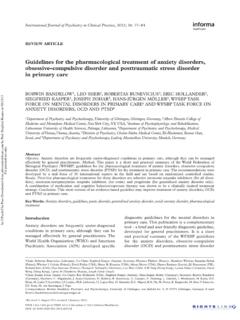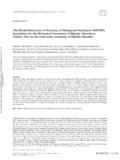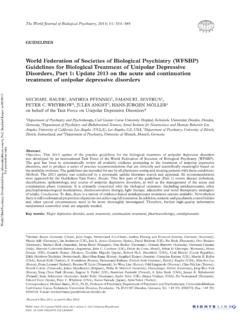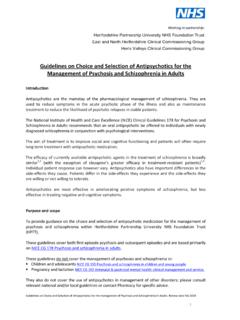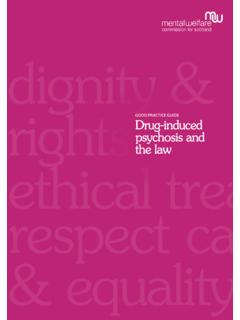Transcription of Guidelines for Biological Treatment of …
1 Treatment Guidelines World Federation of Societies of Biological Psychiatry (WFSBP) Guidelines for Biological Treatment of 3: Update 2015 management of special circumstances: Depression, Suicidality, substance use disorders and pregnancy and lactation ALKOMIET HASAN 1 , PETER FALKAI 1 , THOMAS WOBROCK 2,3 , JEFFREY LIEBERMAN 4 , BIRTE GLENTH J 5 , WAGNER F. GATTAZ 6 , FLORENCE THIBAUT 7 & HANS-J RGEN M LLER 1 ; ON BEHALF OF THE WFSBP TASK FORCE ON Treatment Guidelines FOR schizophrenia * 1 Department of Psychiatry and Psychotherapy, Ludwig-Maximilians-University, Munich, Germany, 2 Centre of Mental Health, Darmstadt-Dieburg Clinics, Gro -Umstadt, Germany, 3 Department of Psychiatry and Psychotherapy, Georg-August-University, Goettingen, Germany, 4 Department of Psychiatry, College of Physicians and Surgeons, Columbia University, New York State Psychiatric Institute, Lieber Center for schizophrenia Research, New York, USA.
2 5 Center for Neuropsychiatric schizophrenia Research & Center for Clinical Intervention and Neuropsychiatric schizophrenia Research, Copenhagen University Hospital, Psychiatric Center Glostrup, Denmark, 6 Department of Psychiatry, University of Sao Paulo, Brazil, and 7 University Hospital Cochin-Tarnier, Faculty of Medicine Paris Descartes, INSERM U 894, Centre Psychiatry and Neurosciences, Paris, France Abstract These updated Guidelines are based on the fi rst edition of the World Federation of Societies of Biological Psychiatry (WFSBP) Guidelines for Biological Treatment of schizophrenia published in the years 2005 and 2006.
3 For this 2015 revi-sion, all available publications pertaining to the Biological Treatment of schizophrenia were reviewed systematically to allow for an evidence-based update. These Guidelines provide evidence-based practice recommendations which are clinically and scientifi cally relevant. They are intended to be used by all physicians diagnosing and treating patients with schizophrenia . Based on the fi rst version of these Guidelines a systematic review, as well as a data extraction from national Guidelines have been performed for this update. The identifi ed literature was evaluated with respect to the strength of evidence for its effi cacy and subsequently categorised into six levels of evidence (A F) and fi ve levels of recommendation (1 5).
4 This third part of the updated Guidelines covers the management of the following specifi c Treatment circumstances: comorbid depres-sion, suicidality, various comorbid substance use disorders (legal and illegal drugs), and pregnancy and lactation. These Guidelines are primarily concerned with the Biological Treatment (including antipsychotic medication and other pharma-cological Treatment options) of patients with schizophrenia . Key words: schizophrenia , comorbid depression , suicidality , comorbid substance use disorder , pregnancy * A. Carlo Altamura (Italy), Nancy Andreasen (USA), Thomas Barnes (UK), M.
5 Emin Ceylan (Turkey), Jorge Ciprian Ollivier (Argentina), Timothy Crow (UK), Aysen Esen Danaci (Turkey), Anthony David (UK), Michael Davidson (Israel), Bill Deakin (UK), Helio Elkis (Brazil), Lars Farde (Sweden), Wolfgang Gaebel (Germany), Bernd Gallhofer (Germany), Jes Gerlach (Denmark), Steven Richard Hirsch (UK), Carlos Roberto Hojaij (Australia), Michael Hwang (USA), Hai Gwo Hwo (Taiwan), Assen Verniaminov Jablensky (Australia), Marek Jarema (Poland), John Kane (USA), Takuja Kojima (Japan), Veronica Larach (Chile), Jeffrey Lieberman (USA), Patrick McGorry (Australia), Herbert Meltzer (USA), Hans-J rgen M ller (Germany), Sergey Mosolov (Russia), Driss Moussaoui (Marocco), Jean-Pierre Oli (France), Antonio Pacheco Palha (Portugal), Asli Sarand l (Turkey), Mitsumoto Sato (Japan), Heinrich Sauer (Germany), Nina Schooler (USA), Bilgen Taneli (Turkey), Lars von Knorring (Sweden), Daniel Weinberger (USA), Shigeto Yamawaki (Japan).
6 Correspondence: PD Dr. med. Alkomiet Hasan, MD, Department of Psychiatry and Psychotherapy, Ludwig-Maximilians-University, Nussbaumstr. 7, D-80336 Munich, Germany. Tel: 49-89-4400-55536. Fax: 49-89-4400-55535. E-mail: The World Journal of Biological Psychiatry, 2015; 16: 142 170 ISSN 1562-2975 print/ISSN 1814-1412 online 2015 Informa HealthcareDOI: J Biol Psychiatry Downloaded from by Medizinische Universitaet Wien on 04/07/15 For personal use only. WFSBP Guidelines schizophrenia special circumstances 143for his assessment and Treatment option.
7 These guide-lines are primarily concerned with the Biological Treatment of adults and they address recommenda-tions in this fi eld. The specifi c aim of these Guidelines is to evaluate the role of pharmacological agents and somatic interventions in the Treatment and manage-ment of schizophrenia , while the role of specifi c psy-chological interventions and specifi c service delivery systems is covered only briefl y. The Guidelines were developed by the authors and concluded by consen-sus with the WFSBP Task Force on schizophrenia , composed of international experts in the fi eld.
8 Methods of literature research and data extraction In the development of these Guidelines the following Guidelines , consensus papers and sources have been considered: American Psychiatry Association, Practice Guide-line for the Treatment of Patients with schizo-phrenia (APA 1997), American Psychiatric Association, Practice Guideline for the Treatment of Patients with schizophrenia , Second Edition (Lehman et al. 2004), and APA Guideline Watch: Practice Guideline for the Treatment of patients with schizophrenia (Dixon et al. 2009). The German Association for Psychiatry, Psy-chotherapy and Psychosomatics (DGPPN).
9 Practice Guidelines Psychiatry and Psychother-apy: schizophrenia (DGPPN 2006). National Institute for Clinical Excellence (NICE): Psychosis and schizophrenia in adults: Treatment and management (NICE 2014) and other NICE Guidelines for separate guidance of special conditions. Royal Australian and New Zealand College of Psychiatrists: Australian and New Zealand clin-ical practice guideline for the Treatment of schizophrenia (RANZCP 2005). World Federation of Societies of Biological Psy-chiatry (WFSBP) Guidelines for Biological Treatment of schizophrenia , part 1: Acute treat-ment of schizophrenia (Falkai et al.)
10 2005) and part 2: Long-term Treatment of schizophrenia (Falkai et al. 2006). The schizophrenia Patient Outcome Research Team (PORT): Updated Treatment Recom-mendations 2009 (Kreyenbuhl et al. 2010) and The 2009 schizophrenia PORT Psychophar-macological Treatment Recommendations and Summary Statements (Buchanan et al. 2010). The Cochrane Library, Meta-analyses on the effi cacy of different drugs and interventions in General introduction Despite more than 50 years of pharmacological research there still exists an evidence gap for the treat-ment of schizophrenia in specifi c circumstances.

